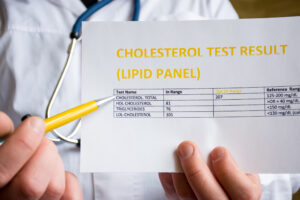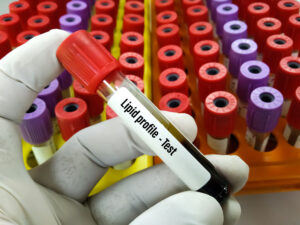Top 4 Lab Tests Men Age 50+ Need to Monitor

Maintaining optimal health through nutrition becomes increasingly important as men get older, especially after age 50. This age marks a period when the body starts to experience significant changes and risk of chronic diseases goes up, necessitating closer attention to nutritional status and overall health. Regularly monitoring specific lab tests can offer insights into your nutritional health, aiding in early detection and management of potential deficiencies or imbalances. Whether you’re a male aged 50+ or you have someone in your life that you care about who is, this period of time is critical for looking ahead to a healthy, happy life as you age.
Here are key nutrition-related lab tests that men over 50 should consider monitoring:
 1. Blood Glucose and Hemoglobin A1C
1. Blood Glucose and Hemoglobin A1C
Blood glucose (aka blood sugar), which should be done fasting, and hemoglobin A1C (often shortened as “A1c”) tests provide information about your blood sugar levels and can indicate pre-diabetes or diabetes. Prediabetes means you have a higher-than-normal blood sugar level, but it’s not elevated enough to be considered diabetes. Diabetes is a chronic disease that occurs when your blood sugar is too high. These conditions are critical to catch early and treat. Here are the levels to look for when you get your labs back:
A1c
Normal: <5.7%
Prediabetes: 5.7-6.4%
Diabetes: >6.4%
Fasting Blood Glucose Levels
Low blood sugar: <70 mg/dL
Normal: 70-117 mg/dL
Slightly elevated: 117-137 mg/dL
Elevated: >137 mg/dL
 To prevent the risk of chronically high blood sugar levels, focusing on a diet rich in fiber and whole foods is essential. Foods such as vegetables, fruits, whole grains, and legumes all contain fiber which can help regulate blood sugar by digesting and absorbing more slowly. Including healthy fats from avocados, olive oil, and fatty fish can also contribute to overall blood sugar stability by slowing the absorption of carbohydrates into the blood. Balancing these foods while choosing whole grains and other complex carbohydrate choices can significantly reduce the risk of high blood sugar levels.
To prevent the risk of chronically high blood sugar levels, focusing on a diet rich in fiber and whole foods is essential. Foods such as vegetables, fruits, whole grains, and legumes all contain fiber which can help regulate blood sugar by digesting and absorbing more slowly. Including healthy fats from avocados, olive oil, and fatty fish can also contribute to overall blood sugar stability by slowing the absorption of carbohydrates into the blood. Balancing these foods while choosing whole grains and other complex carbohydrate choices can significantly reduce the risk of high blood sugar levels.
2. C-reactive Protein (CRP)
C-reactive protein (CRP) is a substance produced by the liver in response to inflammation. Its level in the blood increases when there’s inflammation in the body, making it a useful marker for a wide range of diseases, including infections and heart disease. Healthy levels to look for in your labs:
Normal level: <1.0 – 3.0 mg/L
A Mediterranean Diet can be a helpful dietary pattern to follow for CRP management as it focuses on anti-inflammatory foods including fatty fish and plant-based proteins, whole grains, leafy greens, and plenty of colorful vegetables. Focusing on anti-inflammatory foods can help reduce CRP levels long-term and promote cardiovascular health.
 3. Lipid Profile
3. Lipid Profile
A lipid profile looks at fat in the blood and is critical for assessing cardiovascular risk. These tests measures levels of cholesterol, including low-density lipoprotein (LDL) known as “bad cholesterol,” high-density lipoprotein (HDL) known as “good cholesterol,” and triglycerides — a type of fat in the blood. Here is what to look for in your lipid profile:
Normal Total Cholesterol: <200 mg/dL
Normal LDL level: <100
Normal HDL level: >40
Normal Triglycerides: <150
Nutritional imbalances, such as high intake of saturated fats, can lead to problems like high LDL. Adjusting your dietary habits based on these results can significantly improve cardiovascular health. Switching to healthier fats including avocado, salmon, nuts, and seeds can help make a big difference in your heart health. Eating more plant proteins like tofu, tempeh, lentils, and beans help manage cholesterol because they contain much less saturated fats than animal proteins.
 4. Vitamin D Levels
4. Vitamin D Levels
Vitamin D is a fat-soluble vitamin essential for bone health, immune function, and decreasing the risk for heart disease. As you age, your skin becomes less effective at producing vitamin D naturally from sunlight, and dietary intake is often insufficient, so monitoring vitamin D levels is crucial for men over 50. Low levels of vitamin D can lead to bone density issues, including osteoporosis, and may also affect mood and immune function. Healthy levels to look for in your labs:
Normal level: 20-50 ng/mL or higher
Foods rich in vitamin D include fatty fish (salmon, halibut, mackerel), UV exposed mushrooms, egg yolks, and fortified dairy products. Including these foods in your daily meals can help boost your vitamin D levels.
Regularly monitoring your labs (annually ideally) can provide men over 50 with valuable insights into their health, enabling them to make informed decisions about their diet and lifestyle. It’s important to consult with a healthcare provider to determine the appropriate frequency for these tests and to interpret results within the context of overall health and individual circumstances. By staying proactive about nutritional health, men can enjoy a higher quality of life and reduce the risk of chronic diseases associated with aging. Always make sure to advocate for an interdisciplinary team and get the right referrals. Depending on which labs are out of range, you could benefit from working with a cardiologist, endocrinologist, and/or registered dietitian nutritionist on your health goals.
 References
References
- American Heart Association. What Your Cholesterol Levels Mean. www.heart.org. Published 2017. https://www.heart.org/en/health-topics/cholesterol/about-cholesterol/what-your-cholesterol-levels-mean. Accessed May 10, 2024.
- American Diabetes Association. Understanding A1C | ADA. diabetes.org. https://diabetes.org/about-diabetes/a1c. Accessed May 10, 2024.
- Smidowicz A, Regula J. Effect of nutritional status and dietary patterns on human serum C-reactive protein and interleukin-6 concentrations. Adv Nutr. 2015;6(6):738-747.
- American Heart Association. The American Heart Association’s Diet and Lifestyle Recommendations. www.heart.org. Published November 1, 2021. https://www.heart.org/en/healthy-living/healthy-eating/eat-smart/nutrition-basics/aha-diet-and-lifestyle-recommendations. Accessed May 10, 2024.
